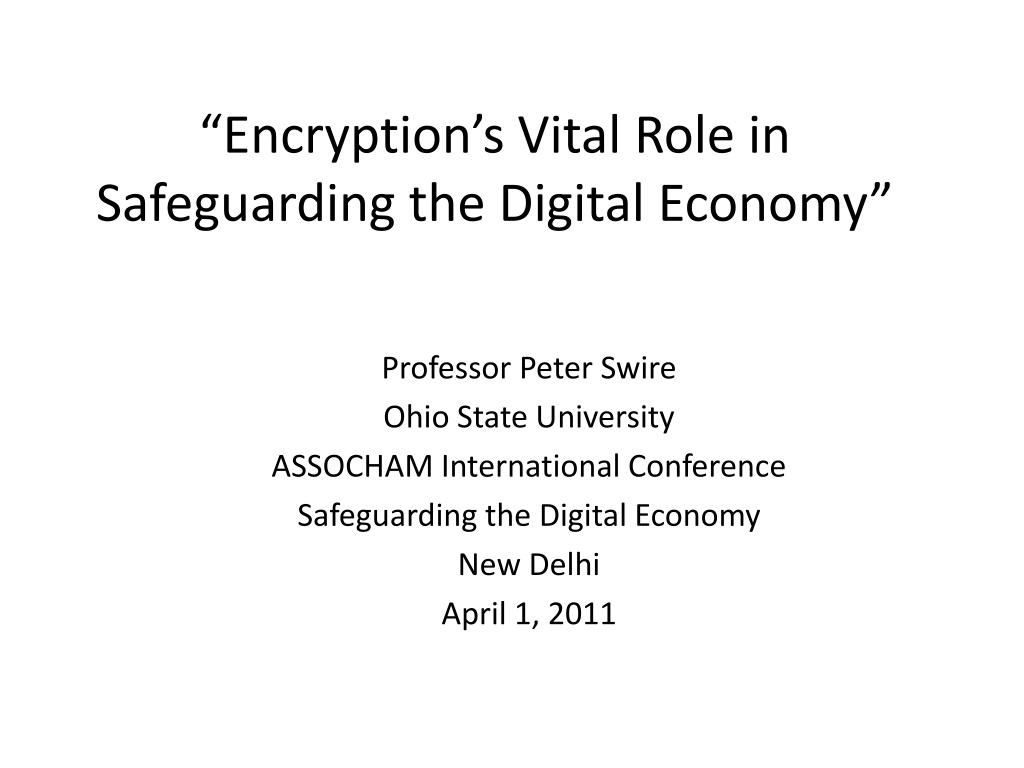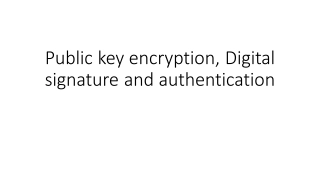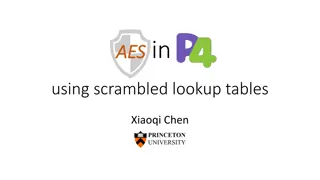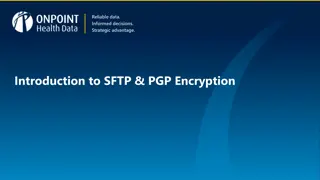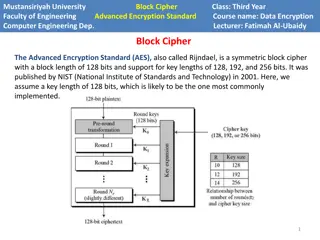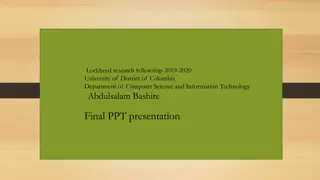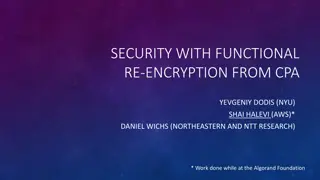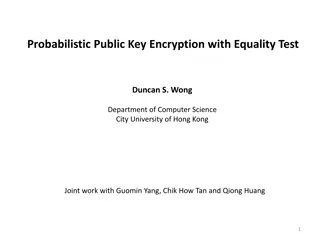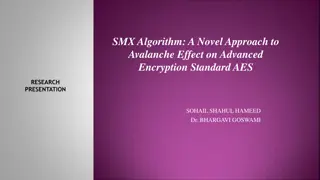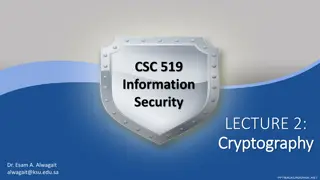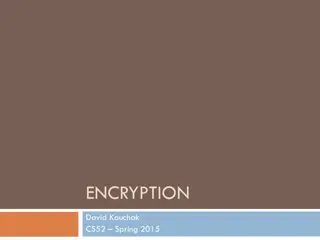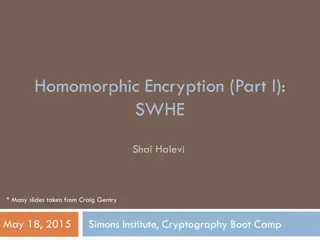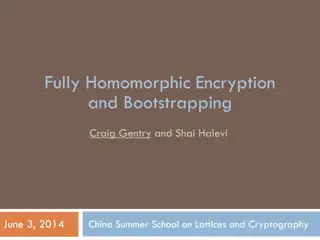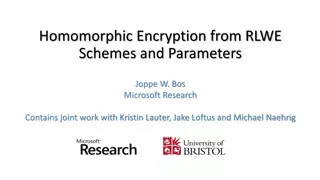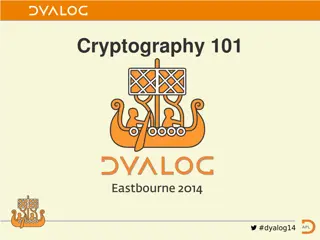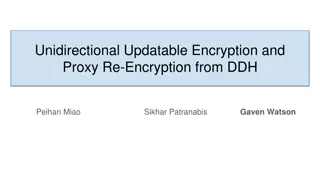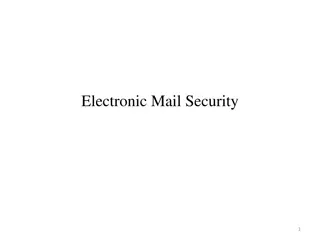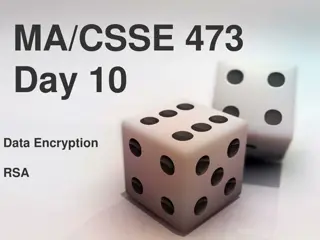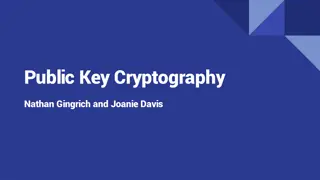The Vital Role of Encryption in Safeguarding the Digital Economy
Encryption plays a crucial role in protecting the digital economy by providing secure communication channels. Professor Peter Swire from Ohio State University emphasizes the need for strong encryption over weak cybersecurity measures. He discusses the history of wiretaps, the shift to strong cryptography in the 1990s, and addresses objections regarding encryption key access and backdoors. Swire's background in law and privacy further underscores the importance of encryption for a usable Internet. Weak encryption poses significant risks, allowing unauthorized entities to intercept data easily, making strong encryption essential in today's interconnected world.
Download Presentation

Please find below an Image/Link to download the presentation.
The content on the website is provided AS IS for your information and personal use only. It may not be sold, licensed, or shared on other websites without obtaining consent from the author. Download presentation by click this link. If you encounter any issues during the download, it is possible that the publisher has removed the file from their server.
E N D
Presentation Transcript
Encryptions Vital Role in Safeguarding the Digital Economy Professor Peter Swire Ohio State University ASSOCHAM International Conference Safeguarding the Digital Economy New Delhi April 1, 2011
Overview My view should have strong encryption, not weak cybersecurity Short history of wiretaps, phone & data U.S. history in 1990s and shift to strong crypto Objection: We want the keys Objection: There must be a back door Conclusion: Answers to these objections, and strong encryption essential to a usable Internet
Swire Background Professor of Law, Ohio State University Based in Washington, D.C. Chief Counselor for Privacy to President Clinton, 1999-2001 Chair, WH Working Group Encryption 1999 Part of 1999 announcement of shift to export of strong encryption 1999 Special Assistant to President Obama, 2009-2010 Issues included broadband, spectrum, privacy, cybersecurity Current research project on encryption policy in a globalizing world Views here are entirely my own, not statement for administration or others
3 Phone call Alice Local switch Telecom Company Local switch Phone call Bob
3 Phone call Alice Local switch Telecom Company Local switch Phone call Bob
3 Hi Bob! Alice Alice ISP %!#&*YJ#$ &#^@% %!#&*YJ#$ &#^@% Internet: Many Nodes between ISPs %!#&*YJ#$ &#^@% %!#&*YJ#$ &#^@% %!#&*YJ#$ &#^@% %!#&*YJ#$ &#^@% %!#&*YJ#$ &#^@% %!#&*YJ#$ &#^@% %!#&*YJ#$ &#^@% %!#&*YJ#$ &#^@% Bob ISP Hi Bob! Bob
Problems with Weak Encryption Nodes between A and B can see and copy whatever passes through Brute force attacks became more effective due to Moore s Law; today, 40 bits very easy to break by many From a few telcos to many millions of nodes on the Internet Hackers Criminals Foreign governments Amateurs Strong encryption as feasible and correct answer Scaled well as Internet users went over one billion
U.S. Experience 1990s Initial inter-agency victory for law enforcement (FBI) and national security (NSA), early-mid 90 s Fear of loss of ability to wiretap Over 5 years of debate, to change in September, 1999 Always had strong crypto within US Exports were controlled, on idea that crypto = munition Change to allow strong crypto export, new global norm (except for a few countries) that strong crypto used on Internet globally Why the change to position contrary to view of law enforcement and security agencies?
Crumbling of Weak Crypto Position Futility of weak crypto rules Meeting with Senator or Congressman Start the clock, how long to search for encryption download ? Get PGP or other strong crypto in less than one minute In world of weak crypto rules, effect on good guys and bad guys Bad guys download PGP, stop the wiretap Good guys follow the rules, legitimate actors get their secrets revealed Banking, medical records, retail sales The military s communications on the Internet, government agencies, critical infrastructure
Objection We Want the Keys The failure of the Clipper Chip Idea was that all users of strong crypto would escrow their keys with law enforcement Advocates for it had various safeguards, e.g., two people in the government had to agree for the key to be revealed Devastating technical arguments against this Some people didn t trust the government If do this for 200 nations worldwide, more people don t trust all the governments Single point of failure if the databank of keys is ever revealed, most/all communications can be read
1 Hi Bob! Encrypt Bob's public key Alice Encrypted message %!#&YJ@$ Alice's local ISP %!#&YJ@$ Backbone provider %!#&YJ@$ Bob's local ISP %!#&YJ@$ Hi Bob! Decrypt Bob's private key Bob
2 Encrypt Hi Fred! Jill at Corporation A, Tata Public key of Corporation B Reliance Encrypted message %!#&YJ@$ Corporation A's ISP Lawful process: (1) Ask Tata before encryption (2) Ask Reliance after decryption %!#&YJ@$ Backbone provider %!#&YJ@$ Corporation B's ISP %!#&YJ@$ Decrypt Hi Fred! Private key of Corporation B, Reliance Fred at Corporation B Reliance.
Objection Isnt There a Back Door? As with Clipper Chip, law enforcement would love to have a back door Back door = designed security flaw in the system May be that law enforcement only can read (Clipper Chip) May be that software/service provider can read (they promise security but keep a secret way in) Goal of back door: All the good guys can get in (and know they can ask for it) No one else, including bad guys, get in: Criminals and their hackers Foreign governments and spy services Ph.D. computer experts White hat hackers people who detect flaws and tell CERTs and others about them
The Likelihood of Back Doors? Let s think through the likelihood that widely-used strong encryption actually has back doors for some law enforcement/national security agencies My view much less likely than many people think Swire writings on when secrecy helps/hurts security Key point is that secrecy not likely to be successful when there are many attackers, who can attack repeatedly, and can report successful attacks A simpler way to say this: Wikileaks What likelihood that the FBI has been pervasively using a backdoor, with knowledge of software/services companies, and it hasn t leaked since 1999 approval of strong crypto? What likelihood that none of the smart Ph.Ds and white hat hackers have ever found an example of this? What brand effect on global brands if they promised security and secretly broke it? What penalties for fraud?
Conclusion In conclusion, very difficult issues about how law enforcement and national security agencies can/should have access to communications, with what legal process But a simple point weak encryption at the heart of the Internet is weak cybersecurity The debate on this topic took several years in the U.S. In the end, wide and stable understanding that strong crypto is essential to do serious business on the Internet Nothing has shaken that position since the U.S. acceptance of strong encryption in 1999 I hope this perspective is helpful as India and other countries seek ways to assure both cybersecurity and national security more broadly in our Internet-dependent age
